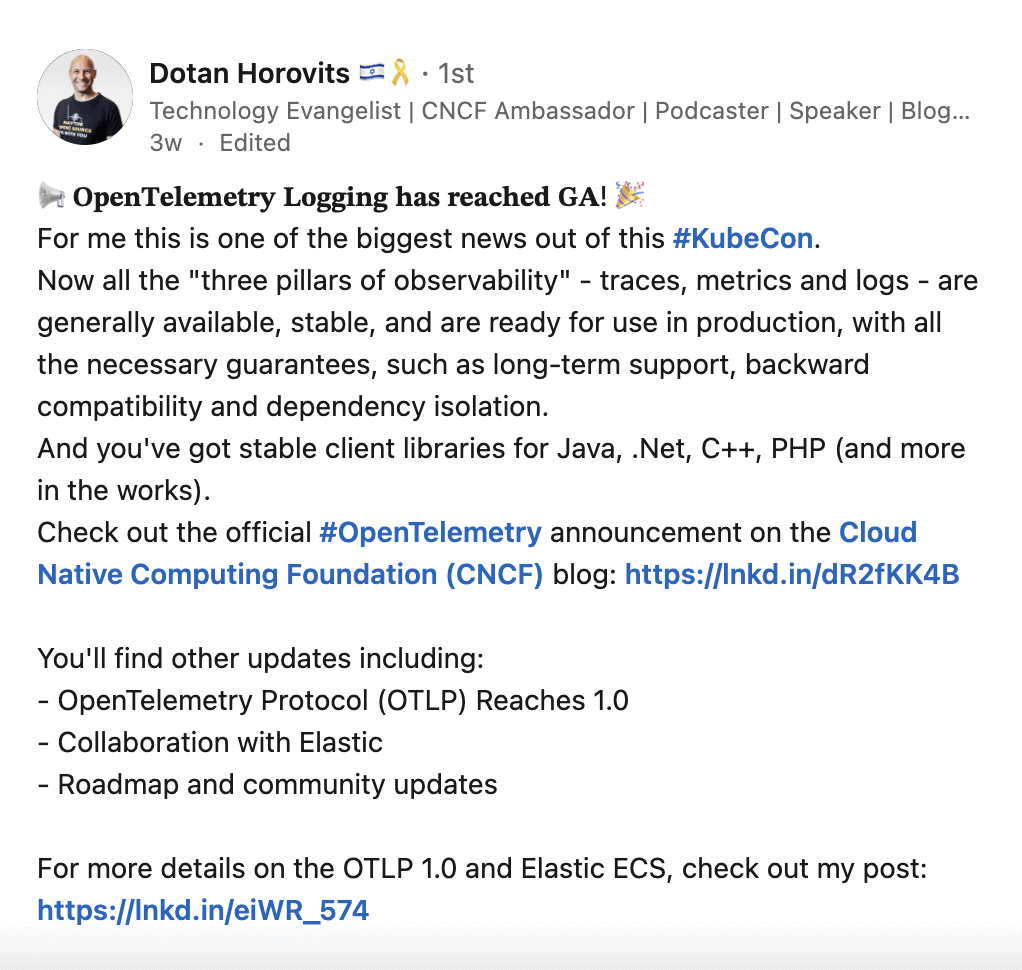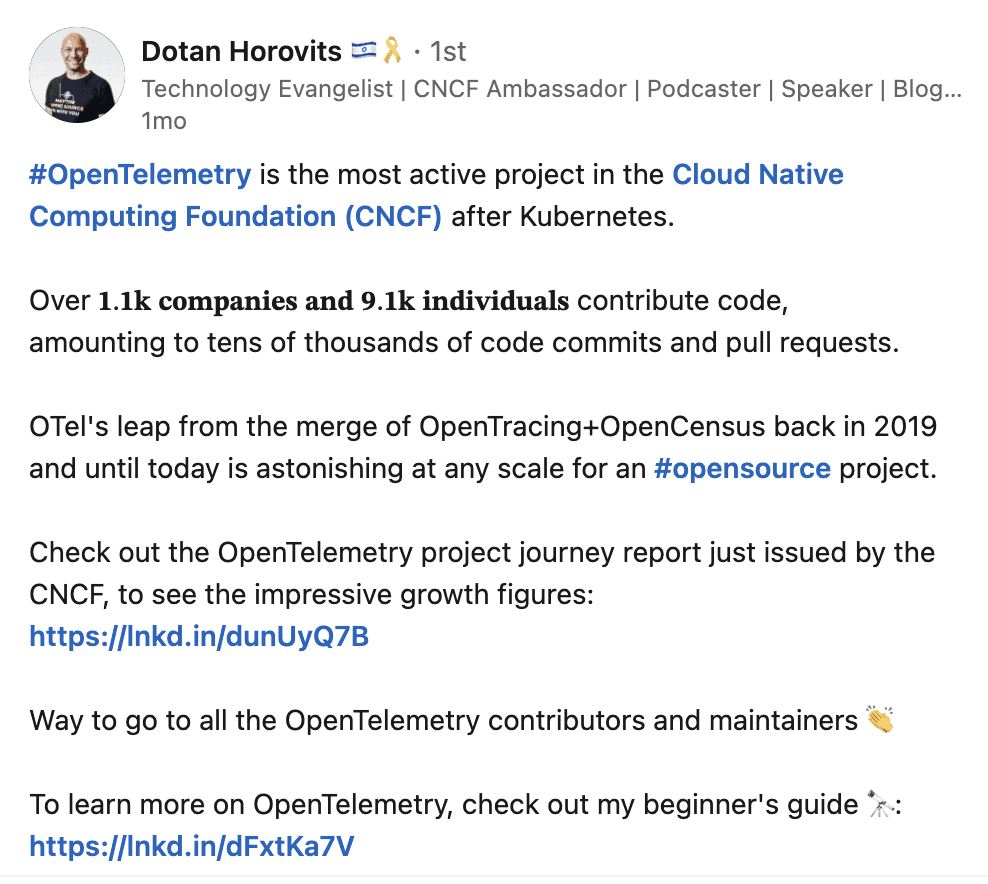Member post originally published on Logz.io’s blog by Dotan Horovits
If you missed KubeCon North America 2023 in Chicago, or you were there and spent more time in the “hallway tracks,” you may have missed some of the big news that came out of the show.
We covered the big happenings in the open source cloud native and observability realm in the latest episode of OpenObservability Talks!
I attended KubeCon remotely, and my guest this month attended in person in Chicago: Lin Sun, Director of Open Source at solo.io, and she’s also on the Steering Committee and Technical Oversight Committee (TOC) for Istio. She’s also a fellow Cloud Native Computing Foundation (CNCF) Ambassador, and has just been nominated co-chair of the CNCF’s Technical Advisory Group for Networking.
In this episode, we explored the latest and greatest highlights from KubeCon, the flagship event of the Kubernetes and cloud native tech space, as well as its notable co-located events, including ObservabilityDay, IstioDay and WASMDay. From cutting-edge innovations to industry insights, we’ve got the broad spectrum covered.
Fluent Bit Releases v2.2, Hits Nearly 11 Billion Downloads
At ObservabilityDay, Fluent Bit announced the release of v.2.2. The very popular log shipping and collection tool now includes YAML configuration and the ability to collect node exporter metrics from Linux, MacOS, Windows and more, inspired by Prometheus Node Exporter.
Astonishingly, Flutent Bit’s creator Eduardo Silva also announced during his talk that Fluent Bit has hit 10.9 billion downloads—with 80% of those coming in just the last 18 months.
Fluent Bit is planning v3.0 for the next KubeCon in Paris in March 2024. For more on what’s going on with Fluent Bit and FluentD, I recently hosted Eduardo Silva on an episode of OpenObservability Talks, which you can find here.
OpenTelemetry Logging Reaches General Availability
There was also big news around OpenTelemetry, CNCF’s fastest-growing project and the second-largest behind Kubernetes. Logging with OTEL has now reached general availability. This means all three pillars of observability telemetry—logging, metrics and traces—are now production-ready with OTEL.
This is the fulfillment of OTEL’s commitment to providing a unified framework for cloud-native telemetry.
Logging is also now available in several languages on OTEL, and client libraries for Java, .Net, C++ and PHP are stable.
OpenTelemetry Protocol (OTLP) Reaches 1.0
Another highlight of the year is the OpenTelemetry Protocol (OTLP) hitting its 1.0 version. This solidifies its place as a stable foundation, and we’re thrilled to see its growing adoption within the open-source realm. Notably, Jaeger has integrated OTLP natively, and Prometheus is on its way to doing the same.

In other OTEL news, its HTTP semantic conventions have been declared stable. It’s the first OpenTelemetry semantic conventions to do so, and includes enhancements resulting from convergence with the Elastic Common Schema. Here’s a recap I also wrote on open standards in observability.
Here is some other news of note from KubeCon NA:
- CNCF posted the OTEL journey report, which included some incredible facts: Over 𝟏.𝟏𝐤 𝐜𝐨𝐦𝐩𝐚𝐧𝐢𝐞𝐬 𝐚𝐧𝐝 𝟗.𝟏𝐤 𝐢𝐧𝐝𝐢𝐯𝐢𝐝𝐮𝐚𝐥𝐬 contribute code, amounting to tens of thousands of code commits and pull requests. OTel’s leap from the merge oOpenTracing+OpenCensus back in 2019 and until today is astonishing at any scale for an Open Source project.
- Crossplane announced v1.14, the biggest release to date, with over 700 commits. They’ve focused on improving the Developer Experience, the CLI and more features.
- Kyverno expands beyond Kubernetes, as the open-source policy engine was originally built for Kubernetes. Now, it adds support for non-Kubernetes workloads by supporting policies that operate on JSON payloads. This is helpful because as a platform engineer, in addition to Kubernetes you also use CI/CD systems, Infrastructure as Code (IaC) tools, serverless workloads, and other cloud services. Now, you can use Kyverno’s declarative policies to apply unified governance across all of these systems.
- Vitess 18 is now generally available. The project provides sharding middleware for MySQL, provides a tool for deploying, scaling and managing large clusters.

On our episode, we also zoomed in on Istio, the popular service mesh open source project that has just recently reached CNCF graduation. We mapped out the service mesh universe, and then dive into Istio’s galaxy, unraveling its architecture, features, and the roadmap direction with Ambient. It’s been an honor discussing it with Lin Sun, the author of the book “Istio Ambient Explained” and co-author of “Istio Explained”. I captured that part on a separate blog post.
Plus, we have more on what was seen and heard around KubeCon North America 2023. Watch the episode on YouTube and watch out for the show to drop where you get your podcasts soon.
Want to learn more? Listen to the full discussion on the latest episode of OpenObservability Talks: KubeCon NA Highlights and Istio Spotlight.
To learn more about how you can get the most out of your favorite open source observability tools, see how Logz.io Open 360™ can help by signing up for a free trial today.